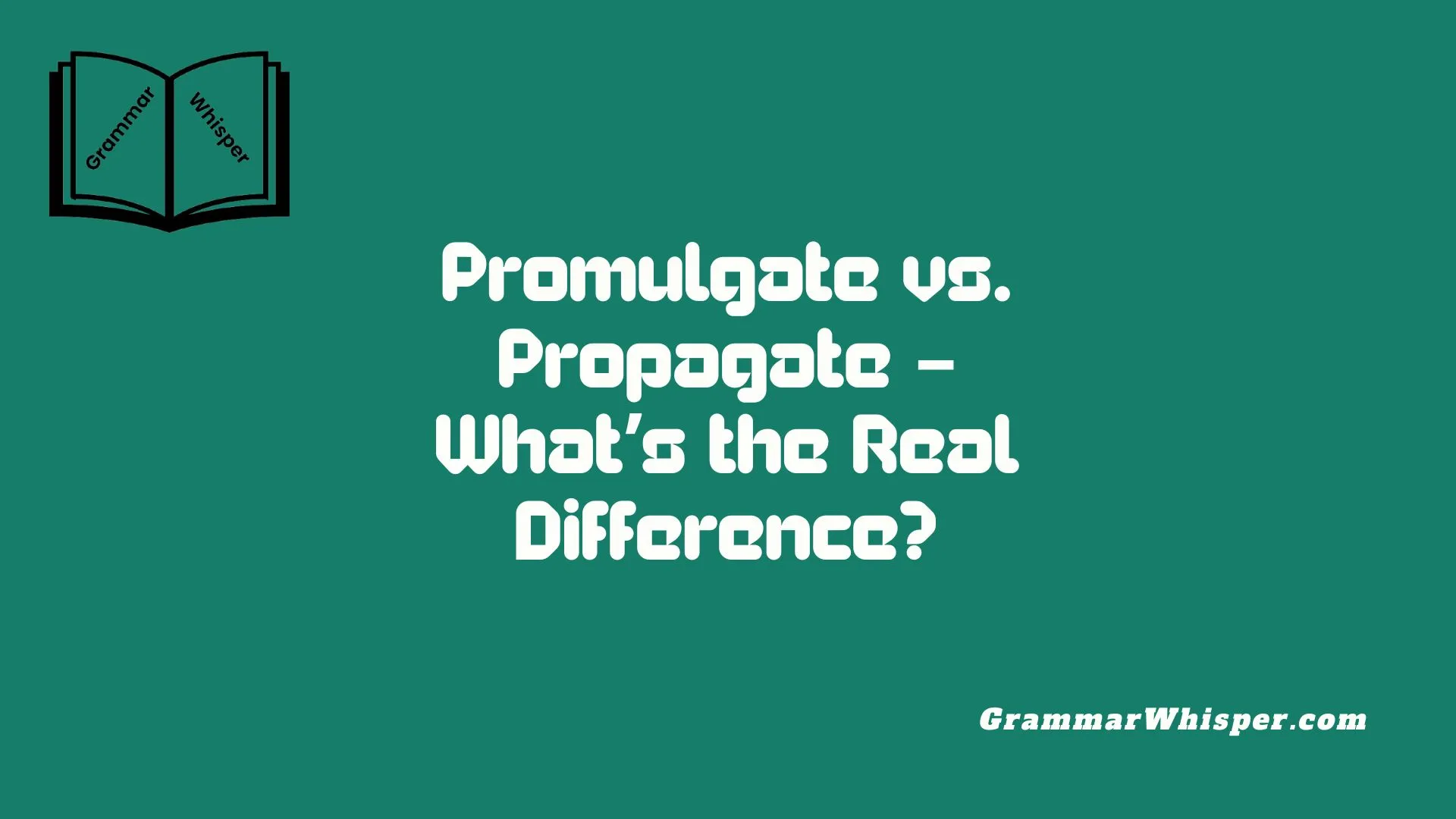When I first started helping professionals fine-tune their resumes and public statements, I noticed how often people mixed up Promulgate vs. Propagate. Though both involve spreading something – like an idea, law, or even a rumor – they aren’t interchangeable. Promulgate is used when you’re officially declaring something, especially in formal settings like publishing a law or an academic article. On the other hand, propagate is more about expanding or multiplying – often seen when ideas, beliefs, or even plants grow and multiply across space or people.
In legal and professional writing, misusing these terms can change the entire meaning of a sentence. I once edited a speech where someone meant to promulgate a company policy but wrote “propagate” instead, which sounded like they were trying to make it go viral instead of stating it formally. Choosing the right words adds depth and precision to communication. If you want to sound like a pro, use them carefully, especially in contexts that demand clarity and tone.
Understanding the Meaning of “Promulgate”
Let’s start with promulgate, a word often found in legal, governmental, and formal contexts.
Etymology of Promulgate
The word promulgate comes from the Latin promulgare, meaning “to publish, proclaim, or make known officially.” Historically, it referred to publishing laws or decrees.
Oxford Dictionary Definition:
“To promote or make widely known (an idea or cause); to put a law or decree into effect by official proclamation.”
Where You’ll See It Used
- Legal Documents: “The new tax regulations were promulgated in March.”
- Government Announcements: “The president promulgated new environmental guidelines.”
- Academic or Religious Writing: “The doctrine was promulgated by the council.”
In short? If something is officially declared, you’re dealing with promulgation.
What Does It Mean to Propagate?
While promulgate is formal and top-down, propagate is all about spread – ideas, beliefs, or even living organisms.
Etymology of Propagate
Propagate stems from Latin propagare, meaning “to extend, spread, increase.” It’s widely used in both scientific and social contexts.
Merriam-Webster Definition:
“To cause to spread out and affect a greater number or greater area; to transmit (something) through space or a medium.”
Where You’ll See It Used
- Botany: “You can propagate this plant from cuttings.”
- Science/Technology: “Radio waves propagate through the atmosphere.”
- Cultural/Ideological: “They worked to propagate misinformation online.”
Use Cases of Promulgate in Modern English
Here’s how promulgate typically functions in context:
| Context | Example Sentence | Tone |
| Legal | “The constitution was officially promulgated in 1987.” | Formal |
| Religious | “The Vatican promulgated new rules on canonization.” | Academic |
| Political | “The new regulations were promulgated by executive order.” | Institutional |
Key Traits of promulgate:
- Used for rules, laws, policies
- Implies authority
- Formal tone
Real-World Applications of Propagate
By contrast, propagate is broader, and can be informal, scientific, or cultural.
| Context | Example Sentence | Tone |
| Botany | “This variety is easy to propagate indoors.” | Practical |
| Social Media | “They propagated the rumor without fact-checking.” | Colloquial |
| Physics | “The signal propagates at the speed of light.” | Scientific |
| Religion | “He sought to propagate the gospel in remote areas.” | Missionary |
Key Traits of propagate:
- Used for ideas, rumors, plants, energy
- Suggests growth or spread
- Can be intentional or organic
Promulgate vs. Propagate: Functional and Grammatical Differences
Let’s place both side by side to really understand what sets them apart.
| Feature | Promulgate | Propagate |
| Verb Type | Transitive (requires direct object) | Usually transitive, sometimes intransitive |
| Meaning | To declare or make official | To spread, multiply, or increase |
| Context | Legal, religious, institutional | Scientific, social, ideological |
| Formality | High | Ranges from neutral to informal |
| Implied Authority? | Yes | Not necessarily |
| Example Use | “Promulgate a law” | “Propagate a belief” |
Pro Tip: If what you’re spreading is official, it’s probably best to promulgate. If what you’re spreading is natural or organic, you’ll want to propagate.
Examples That Clarify Usage
Examples Using Promulgate
- The university promulgated new policies on plagiarism.
- The government promulgated emergency protocols after the flood.
- He promulgated a radical interpretation of the charter.
Examples Using Propagate
- The activist group aims to propagate environmental awareness.
- You can propagate succulents by planting their leaves.
Conspiracy theories tend to propagate rapidly on social platforms.
Comparison Breakdown
| Sentence | Correct Verb | Why? |
| “They promulgated rumors on Twitter.” | ❌ Incorrect | Rumors are spread informally – should use propagate |
| “The policy was propagated by decree.” | ❌ Incorrect | Official policy = should use promulgated |
| “He propagated his agenda in the media.” | ✅ Correct | Informal, ideological spread |
Common Misconceptions and Pitfalls
Despite their different meanings, people misuse these verbs – especially in:
- Academic writing
- Journalism
- Speeches and press releases
Why this happens:
- They sound alike
- Both can relate to communication or spreading
- Poor usage by AI tools or outdated grammar-checkers
- ESL learners taught loose synonyms without context
Quick Fix Tip: Ask yourself, “Is this an official announcement?” If yes, use promulgate. If not, and it spreads or grows – use propagate.
It’s not always obvious which word fits your sentence best – especially in a high-stakes context like a presentation, research paper, or policy document. But here’s a simple breakdown that helps:
Use “Promulgate” if:
- You’re referring to laws, rules, policies, or doctrines
- There’s a sense of authority or formality
- You’re dealing with government, religion, or institutions
Examples: ✔️ “The president promulgated a new executive order.” ✔️ “The council promulgated changes to the religious calendar.”
Use “Propagate” if:
- You’re talking about ideas, beliefs, rumors, or physical entities
- The spread is organic, viral, or growth-based
- The context is scientific, cultural, or informal
Examples: ✔️ “The video propagated quickly across social media.” ✔️ “Farmers propagate plants from healthy cuttings.”
A Quick Rule of Thumb Table
| Ask Yourself… | Use This Word |
| Is it an official law or decree? | Promulgate |
| Is something spreading informally or naturally? | Propagate |
| Does the sentence involve government or policy? | Promulgate |
| Is it about science, ideas, or cultural beliefs? | Propagate |
Enhancing Your Vocabulary: Style, Precision, and Authority
Words shape how others perceive your intelligence, clarity, and credibility.
Using precise terms like promulgate or propagate shows:
- Mastery of nuanced vocabulary
- Sensitivity to tone and context
- Control over formal vs. informal register
Why It Matters
Let’s compare two versions of the same idea:
“The government spread the new law.” 🔻 Informal, vague
“The government promulgated the new law.” ✅ Specific, formal, authoritative
Likewise:
“They spread religious teachings.” 🔻 Casual and bland
“They propagated religious teachings throughout the region.” ✅ Clear, elevated, informative
Good writing isn’t about using complex words – it’s about using the right words.
Case Study: When a Misused Verb Backfired
In 2021, a major nonprofit organization issued a press release stating:
“We seek to promulgate community engagement through our outreach program.”
The problem? They weren’t issuing policy – they were trying to build awareness. The better word? Propagate.
The correction read:
“We seek to propagate community engagement through our outreach program.”
Lesson: The wrong verb diluted their message. The revised version clarified their intent – and sounded far more authentic.
Quick Visual Reference Table
| Verb | Definition | Formality | Used For | Example |
| Promulgate | Officially declare, publish, make known | High | Laws, policies, doctrines | “The charter was promulgated by the assembly.” |
| Propagate | Spread, multiply, transmit, or reproduce | Medium | Ideas, plants, beliefs, signals | “The rumor propagated through social networks.” |
Test Yourself: Can You Choose the Right Word?
Try selecting the right verb for each:
- The council ________ a new rule banning plastic bags.
- The activist worked to ________ a sustainable message.
- The group ________ their doctrines via pamphlets.
- Plants can be ________ through leaf cuttings.
Answers:
- Promulgated
- Propagate
- Propagated
- Propagated
Conclusion
While promulgate and propagate may seem interchangeable at first glance, they serve very different purposes.
- Promulgate carries authority, formality, and official weight.
- Propagate implies spread, growth, and often organic influence.
Mastering this distinction doesn’t just improve your writing – it makes your message clearer, more professional, and easier to trust. When used correctly, these two words can give your communication a polished, confident edge that stands out.
FAQs
What’s the main difference between “promulgate” and “propagate”?
Promulgate means to officially declare or make known, especially laws or rules. Propagate means to spread, either an idea, plant, or message – typically without formal authority.
Is “propagate” ever used in legal or governmental contexts?
Rarely. Promulgate is preferred in official contexts like legislation, whereas propagate fits better in scientific or social discussions.
Can you propagate a law?
No. That would be incorrect usage. Laws are promulgated because they are officially announced or enforced.
What are some informal uses of “propagate”?
“Propagate” is used in everyday conversations involving rumors, memes, or messages. For instance:
“False information propagated across Reddit in hours.”
What’s a good memory trick for the difference?
Think of “Promulgate = Proclaim (officially)” and “Propagate = Plant (ideas, organisms, or beliefs).”











